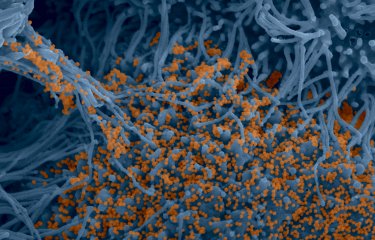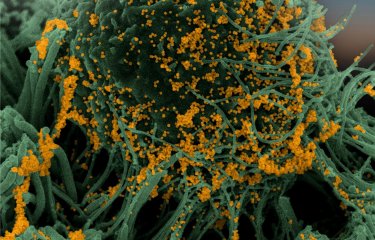The team of the Department of General Pediatrics and Infectious Diseases of the Necker-Enfants Malades AP-HP Hospital, the Institut Pasteur, Inserm and the University of Paris, conducted a prospective observational study between April 27 and May 15, 2020 to describe the characteristics of children and adolescents hospitalized in a context of Kawasaki disease-like syndrome in a COVID-19 epidemic context, with a systemic hyper-inflammatory expression. The results of this study were published on June 3, 2020 in the journal BMJ .
This work included all children and adolescents hospitalized during the study period with signs of Kawasaki disease. Clinical and biological data, imaging and cardiac ultrasound data, treatments and clinical course were collected. A nasopharyngeal sample for SARS-CoV-2 by RT-PCR and a sample for IgG antibodies against the virus were systematically performed for all patients included.
During the study period, 21 patients were admitted to the general pediatrics and infectious diseases department with signs of Kawasaki disease. Their median age was 7.9 years (range, 3.7-16.6 years), and 12 patients (57%) had a parent or grandparent born in a sub-Saharan African country. Twelve patients (57%) developed shock syndrome related to Kawasaki disease and 16 patients (76%) developed myocarditis. Seventeen patients (81%) required intensive care or pediatric resuscitation. All of these children had noisy digestive symptoms at the onset of the disease and all had high inflammatory markers. Nineteen patients (90%) had markers of recent SARS-CoV-2 infection (RT-PCR positive for 8/21, and presence of IgG antibodies for 19/21 patients). All patients received intravenous immunoglobulins and ten (48%) also received corticosteroids. The clinical course was favorable in all cases. Coronary dilations were detected in five (24%) patients during hospitalization.
The abnormally high number of children and adolescents with Kawasaki disease recently observed in the Paris region could be linked to exposure to SARS-CoV-2. The study conducted cannot formally establish a causal link with infection with the SARS-CoV-2 virus despite very strong suspicion. The characteristics of these patients differ from those observed during classic Kawasaki disease: these patients are older, more often of descent from a sub-Saharan African country, with more frequently digestive manifestations in the foreground, severe forms of myocarditis and hemodynamic instability.
Source
Kawasaki-like multisystem inflammatory syndrome in children during the covid-19 pandemic in Paris, France: prospective observational study, BMJ, June 3, 2020
Julie Toubiana,1,2 Clément Poirault,1 Alice Corsia,3 Fanny Bajolle,4 Jacques Fourgeaud,5 François Angoulvant,6 Agathe Debray,1 Romain Basmaci,7 Elodie Salvador,3 Sandra Biscardi,8 Pierre Frange,9 Martin Chalumeau,1,10 Jean-Laurent Casanova,11,12 Jérémie F Cohen,1,10 Slimane Allali1
1 Department of General Paediatrics and Paediatric Infectious Diseases, Necker-Enfants Malades University Hospital, Assistance Publique – Hôpitaux de Paris (AP-HP), Université de Paris, 149 rue de Sèvres, 75015 Paris, France
2 Institut Pasteur, Biodiversity and Epidemiology of Bacterial Pathogens, Paris, France
3 Paediatric Intensive Care Unit, Necker-Enfants Malades University Hospital, AP-HP, Université de Paris. Paris, France
4 M3C-Necker-Enfants Malades University Hospital, Université de Paris, Paris, France
5 Virology Laboratory, Necker-Enfants Malades University Hospital, AP-HP, Université de Paris, Paris, France
6 Pediatric Emergency Department, Necker-Enfants Malades University Hospital, AP-HP; INSERM, Centre de Recherche des Cordeliers, UMRS 1138, Université de Paris, Paris, France
7 Pediatric and Emergency Unit, Louis Mourier Hospital, Université de Paris, Paris, France
8 Pediatric Emergency Unit, Hôpital Intercommunal, Créteil, France
9 Department of Clinical Microbiology, Necker-Enfants Malades University Hospital, AP-HP; EHU 7328 PACT, Imagine Institute, Université de Paris, Paris, France
10 Obstetrical, Perinatal and Pediatric Epidemiology Research Team, Centre of Research in Epidemiology and Statistics, INSERM, Université de Paris, Paris, France
11 Laboratory of Human Genetics of Infectious Diseases, Necker Branch, Imagine Institute, Pediatric Hematology and Immunology Unit, Necker-Enfants Malades Hospital, AP-HP, Université de Paris, Paris, France
12 St Giles Laboratory of Human Genetics of Infectious Diseases, Rockefeller Branch, The Rockefeller University, Howard Hughes Medical Institute, New York, NY, USA
doi: https://doi.org/10.1136/bmj.m2094
This study is part of the priority scientific area Emerging infectious diseases of the Institut Pasteur's strategic plan for 2019-2023.





